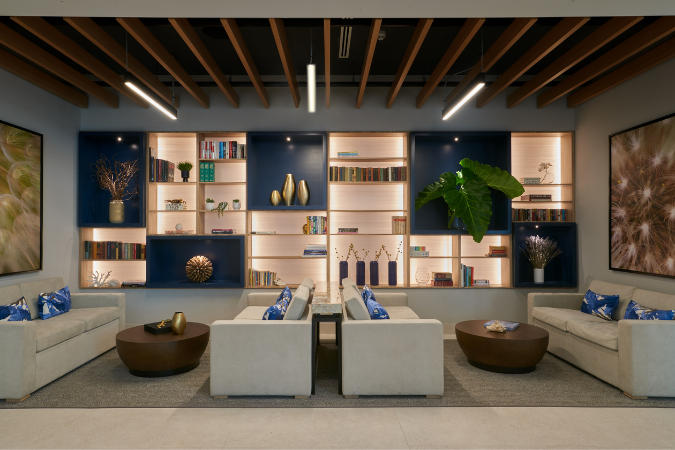7 Innovative Hotel Design Trends to Watch for in 2024
Written by Cristina VillalónABOUT THE AUTHOR | Cristina Villalón is the Co-Founder, CEO & Director of Interior Design of AD&V®.
As we step into 2024, the hotel industry continues to evolve, adapting to meet travelers' changing needs and preferences.
In the coming year, hotels are set to embrace a wave of innovative design trends that enhance the guest experience and contribute to a more sustainable and technologically advanced future.
Let's explore some of the innovative hotel design trends that are expected to redefine the way we experience hospitality in 2024:
1. FLEXIBLE & ADAPTABLE SPACES
In response to remote work and changing work dynamics, hotels are redesigning their spaces to be more flexible and adaptable.
Expect to see extended stay options aimed at digital nomads, remote workers, and multigenerational travelers designed with multifunctional areas that can be easily transformed from workspaces to social hubs. This trend caters to the evolving needs of guests who seek a blend of work and leisure during their stay while adding more functionality to the design of hotel rooms.
2. SMART ROOM TECHNOLOGY
With the rise of digitalization, the future of hotel rooms lies in smart technology. Guests can expect a seamless high-tech experience from automated check-ins to rooms with voice-activated controls.
Imagine adjusting the room temperature, lighting, and entertainment systems with a simple voice command. This trend will enhance convenience and position hotels at the forefront of technological innovation.
3. AI SERVICES
Speaking of tech innovations, the integration of Artificial Intelligence (AI) in hotel design and services will rise in 2024. This transformative technology empowers designers to analyze guest data and use it to craft uniquely tailored spaces.
There are already AI-powered concierge services that offer personalized recommendations, anticipate guest needs, and streamline communication. Whether suggesting local restaurants, providing weather updates, or assisting with travel arrangements, AI will be integrated to enhance the guest experience moving forward.
4. DIGITAL EXPERIENCES
Similarly, hospitality services have continued to transition from in-person to digital. Immersive technologies like Augmented Reality (AR) and Virtual Reality (VR) are set to revolutionize how guests experience their surroundings.
Hotels will incorporate AR and VR elements into their designs, allowing guests to explore local attractions, learn about the local history, or even enjoy virtual art installations within the hotel premises. This trend will enhance the overall stay by providing unique and interactive experiences.
5. BIOPHILIC ELEMENTS
At the same time, hotels will be designed with plenty of natural and biophilic elements to improve health and overall well-being. There has been a keen focus on the vital connection between people and nature because it affects our health and productivity.
Designers are increasingly using daylighting techniques, natural ventilation, indoor gardens, organic building materials, nature views and water, and other natural design elements to help us connect with nature. Expect to see more biophilic design elements in 2024.
AD&V Headquarters’ moss wall.
6. SUSTAINABLE PRACTICES
The hospitality industry will see more sustainable, eco-friendly practices driven by consumer demand for environmentally responsible accommodations. Hotels in 2024 will showcase sustainable designs and practices featuring energy-efficient systems, green roofs, and recycled and locally sourced materials.
Solar panels, recycled wood, organic materials, hourglass timers in showers, locally handcrafted items, and repurposed furniture are some of the trends we will also be seeing. The hospitality industry will ultimately focus on promoting a healthy environment for its guests by conserving energy, minimizing waste, and reducing its overall carbon footprint.
7. A SENSE OF PLACE
As travelers become more discerning, authenticity has become a crucial factor in hotel design. For this reason, designers are focusing more on creating a sense of place in hospitality that feels rooted in its location and resonates with guests. Whether through the architecture, decor, materials, or even the food served, each element is thoughtfully chosen to reflect the culture and essence of the location.
LOOKING AHEAD
These hospitality design trends signify a shift towards more sustainable, healthy, personalized, and technologically advanced accommodations. From the seamless integration of nature to embracing innovative technologies, these trends are set to redefine how we perceive and experience hospitality. It's an exciting time for the industry, with endless opportunities for innovation and creativity!
To learn how technology is transforming the hospitality industry and how to use it to boost the guest experience to a new level, download this helpful guide:
Innovation-Driven Technology Revolutionizes the Hotel Guest Experience







